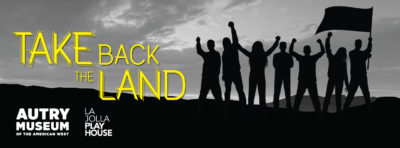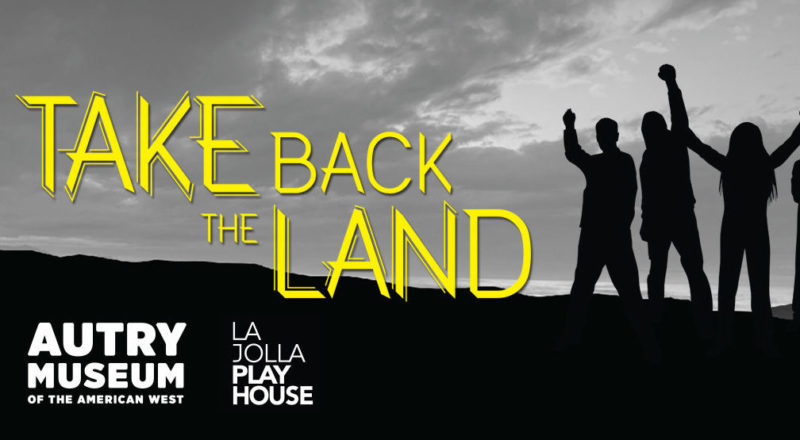INTERVIEW: Native Americans find their voice at Autry’s ‘Take Back the Land’ festival

The Autry Museum of the American West in Los Angeles has been helping to produce plays by Native American writers for years, thanks to its unique Native Voices initiative. On Sunday, Nov. 13, the tradition continues with the sixth-annual short play festival, which this year has been built around the theme of Take Back the Land. Audience members can expect stories surrounding climate change, the environment and loss of land. For anyone who follows news of Native American communities, these topics should feel familiar.
“This is usually one of our best attended events,” said Jean Bruce Scott, producing executive director of Native Voices. “This year we have seven short plays by Native writers. It’s our sixth-annual short-play festival, and we got entries/submissions in from across the United States. This year we have playwrights from New Mexico, Alaska, New York, Kansas, Arizona, Hawaii and New York City, so we’re really excited.”
The stories from the seven playwrights deal with land loss from multiple perspectives. It could be the loss of land by legal means or the loss of land by environmental disruption. Scott said that this year’s slate are truly “terrific” selections, including several comedies, dramedies and one drama.
“What’s fun about the festival is that all of the plays run between five minutes and no longer than 15 minutes, so you get a taste of everything in under 90 minutes,” she said. “The whole program lasts about 90 minutes, and that includes a judging portion where the audience’s response is also figured into the judging. And one of the playwrights will win a $1,000 cash prize award in honor of Von Marie Atchley, who is Randy Reinholz’s grandmother. Randy Reinholz is the producing artistic director of Native Voices, and he’s an enrolled member of the Choctaw Nation of Oklahoma. And his grandmother was a great storyteller, so we instituted this award in her name and in her honor.”
Among the playwrights represented are a few names that have been associated with Native Voices for a number of years. Frank Henry Kaash Katasse (Tlingit) won the Von Marie Atchley Excellence in Playwriting Award at last year’s short-play festival for Reeling, and this year he saw his full-length comedy, They Don’t Talk Back, produced by Native Voices at the Autry and La Jolla Playhouse. In fact, the play is now gearing up for a winter run at the Perseverance Theatre in his native Alaska.
“We had 27 entries,” Scott said. “Those were sent to a national reading panel, and the national reading panel selected this seven. So Frank writes a good, heartfelt and usually funny play. This year … Bear in Stream is a dramedy, so it’s a drama with some comedy in it.”
Another writer featured in the festival is Diane Glancy (Cherokee) whose Buffalo Story was a highlight from a previous festival. This time, she’s bringing Porcupine, a drama about the ever-controversial frakking industry.
Claude Jackson (Gila River Indian Community) is represented with Waiting for H2O. His play involves two little boys who are members of the Gila River Tribe in Arizona. The characters are told that a river once ran through their land, but they’ve never seen the flow. Eventually the boys realize that the Gila River Indian Community lost their water rights because the mighty river was used, abused and drained upstream. Their narrative joins with the international cry of others who live downstream and are subject to river divergence and water exploitation.
“Article 13 is a very satirical look at the selling of Manhattan in which a moose is one of the negotiators, so that’s definitely a comedy,” Scott said. “Backstage, Blue Moon is also a comedy. The Blue Moon Café is a comedy club, comedy theater, and we’ve got four comedians getting ready to go on stage, and they’re the four directions. So Mother Earth comes to talk to them and find out why they can’t get on stage because every time they make a move, they’re zapped back down into the world to try and help people with all of these environmental concerns. That’s definitely a comedy.”
Alan Kilpatrick (Cherokee) wrote Article 13: Or How Manhattan Was Sold, and Ed Bourgeois (Mohawk) wrote Backstage, Blue Moon. Other entries include Snooky is a Terrorist by Vickie Ramirez (Tuscarora) and Dance by Jay Muskett (Navajo).
“This is a new playwright to us, Jay Muskett, a Navajo fellow who is on faculty at the Institute of American Indian Art, and he’s got a grandmother as the lead character,” Scott said. “She has some hip problems and uses a walker, but she’s determined that she’s going to go out into their drought-stricken community and dance a ceremony so that they can get some rain and help the planet. Her daughter and granddaughter are both trying to get her back in the house, but grandma makes a pretty strong argument.”
Scott is constantly reading scripts for the many theatrical offerings of Native Voices. She also travels extensively to see productions of plays that originated at the Autry. Here’s how her schedule shapes up:
“Back in August/September we were reading all of these [plays] and getting them out to the committee and selecting,” she said. “Once we select them, then we contact the playwrights. All of the playwrights are given the option of continuing to work on their plays with the dramaturge. Most often they take that opportunity, so we’ve been doing what we call ‘distant dramaturgy’ on all seven plays. And the playwrights are busy revising them and polishing them, getting them ready for the festival. So that’s going on. At the same time, we just got in the final submissions for our full-length play selection, and I’m busy reading those. I work on the budgets. I help write the grants. I work on the schedules. This is always quite a challenge.”
The actors and creative team went into rehearsal on the short-play festival Wednesday, Nov. 9. They will continue working through Friday, Nov. 11 and then take a well-deserved break to enjoy the Autry’s American Indian Arts Marketplace, which runs concurrently with the short-play festival.
“Writers will still be in contact via texting, so if we have questions about the script, or they say, ‘Hey, I thought of a funnier line here,’ they can text in and give us that information,” Scott said. “So we’ll rehearse straight through until Saturday we take off. Everybody goes to an Indian Arts Market, which is a treat, and then Sunday we have a final rehearsal in the morning and then the show in the afternoon. I’ve also rounded up five wonderful judges for this year’s judging, and during the festival while the audience is watching, after each play, I run down and gather up their scores and compute their scores so that by the end of the festival we can announce who won the Von Marie Atchley Excellence in Playwriting Award. My days are quite busy all the time because we’re always working on new plays.”
Next up, Scott will help Reinholz with his play Off the Rails, which was produced at Native Voices a couple of years ago and will now be part of the Oregon Shakespeare Festival season. They will also head to the Perseverance Theatre in Juneau, Alaska, to help produce They Don’t Talk Back, Katasse’s play, which runs from Jan. 27 to Feb. 19.
Native Voices also has a connection with the La Jolla Playhouse in San Diego, where many of the productions also play. In fact, the short-play festival will be performed at La Jolla Monday, Nov. 14.
“I eat and sleep native theater,” Scott said. “We’re very lucky with our Autry audience because we have a very large urban Indian population in Los Angeles, so we know right away when things are hitting because our audience tells us. About 30 percent of our audience are Native Americans, so I think that non-Native folks coming into the theater … they’re given permission to relax and enjoy the plays because they know that they’re being told by Native people. And they’ve got Native people in the audience who are there watching.”
By John Soltes / Publisher / John@HollywoodSoapbox.com
The Native Voices’ sixth-annual short-play festival, Take Back the Land, will play at the Autry Museum of the American West in Los Angeles, Sunday, Nov. 13 at 1:30 p.m. and at the La Jolla Playhouse in San Diego, Monday, Nov. 14. Click here for more information.

